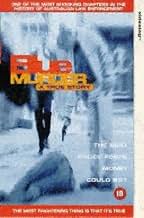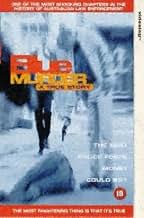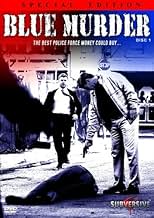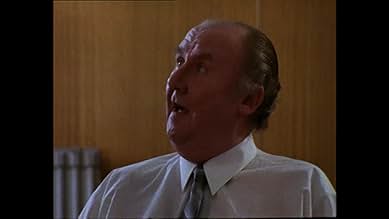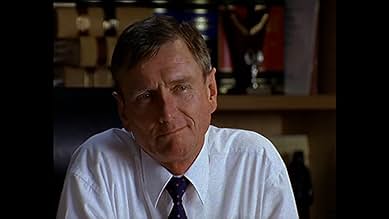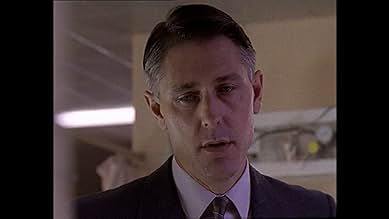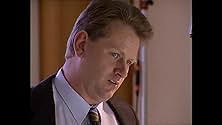Blue Murder
- Miniserie de TV
- 1995
- 3h 18min
CALIFICACIÓN DE IMDb
8.2/10
1.2 k
TU CALIFICACIÓN
Agrega una trama en tu idiomaSet in 1980s Sydney, this acclaimed mini-series tells the story of the relationship between corrupt Detective Roger Rogerson and one of Australia's most infamous criminals Neddy Smith.Set in 1980s Sydney, this acclaimed mini-series tells the story of the relationship between corrupt Detective Roger Rogerson and one of Australia's most infamous criminals Neddy Smith.Set in 1980s Sydney, this acclaimed mini-series tells the story of the relationship between corrupt Detective Roger Rogerson and one of Australia's most infamous criminals Neddy Smith.
- Premios
- 6 premios ganados y 2 nominaciones en total
Explorar episodios
Opiniones destacadas
Members of the New South Wales Police Force, now called the Police Service, are the spiritual descendants of that raffish group of officers and men called 'The Rum Corps' who once took over the fledgling colony of New South Wales and expelled the Governor, the unhappy William Bligh. They were not called to account for that action and have been getting away with it ever since, even on occasion with murder. This 3 hour film traces the rise and decline of two policeman, one honest and the other a fine inheritor of the old traditions, and the careers of some of the criminals they were supposed to be catching. Made 5 years ago, its showing in NSW was held up until July 2001 because of outstanding charges against some of the principals, even though all the events depicted took place at least 10 years before the film was made.
It is an exciting story and I found it enthralling, despite knowing its broad outline. The core of it is the evolving relationship between gung-ho armed hold-up squad detective, Roger Rogerson, and the criminal he 'manages,' Arthur 'Neddy' Smith. Early on, Rogerson makes it clear that he is in charge and Neddy will do what he is told. As the story progresses, and Rogerson sinks deeper into the mire, Neddy becomes a partner, until the end they are co-conspirators in a number of evil deeds. Inevitably the 'management' of crime becomes criminal activity itself, and the bent copper turns out to be just as bad as the criminals he exploits.
Rogerson and the rest of the 'barbecue set' (his police cronies) were a bit unlucky that in the early 80s the NSW government by some oversight managed to appoint an honest police commissioner, John Avery, who, despite being a bit of a boy scout, made some inroads into entrenched corruption in the Force. Rogerson was also unlucky that the federal crime authorities, eager to prove their worth, spotted him as a target. Yet, despite being shown in the film as responsible for several killings, Rogerson's only convictions are for operating a bank account under a false name (which contained the proceeds of a Bentley he had sold) and then lying about it on oath.
This is a particularly well-made film, with a grainy realism appropriate to the subject matter, good locations (the real places, mostly) and good lighting, cinematography and editing. Some of the acting is also first-rate. Richard Roxburgh is quite uncanny - he IS Roger Rogerson, and Tony Martin gives us an interesting well-rounded Neddy, a character it would be easy to portray as a monster. Bill Hunter as always steals his few scenes as Black Angus McDonald, the (now dead) corrupt senior policeman who protects Rogerson, and Steve Bastoni is quietly effective as the hesitant but honest and rather brave policeman Michael Drury.
I also enjoyed John Hargreaves, all good-humoured guile, as barrister Chester 'Funnel-Web' Porter. Chester, a legend of the Sydney Bar, represented Rogerson on a criminal charge trying to bribe Drury into giving false evidence. After getting a celebrity acquitted in difficult circumstances previously, Chester had been presented by some of his fellow barristers with a T-shirt bearing the legend 'Chester Porter walks on water'. In the end, however, even Chester cannot save Rogerson, the most highly decorated policeman in the state, from public disgrace.
Roger the Dodger is still around, in fact he was reported recently as admiring Richard Roxburgh's performance (as well he might). As for the rest though, 'it's all bullshit mate.'
Postscript 2006: "The Dodger" by former policeman Duncan Macnab chronicles Roger's rise and fall.
It is an exciting story and I found it enthralling, despite knowing its broad outline. The core of it is the evolving relationship between gung-ho armed hold-up squad detective, Roger Rogerson, and the criminal he 'manages,' Arthur 'Neddy' Smith. Early on, Rogerson makes it clear that he is in charge and Neddy will do what he is told. As the story progresses, and Rogerson sinks deeper into the mire, Neddy becomes a partner, until the end they are co-conspirators in a number of evil deeds. Inevitably the 'management' of crime becomes criminal activity itself, and the bent copper turns out to be just as bad as the criminals he exploits.
Rogerson and the rest of the 'barbecue set' (his police cronies) were a bit unlucky that in the early 80s the NSW government by some oversight managed to appoint an honest police commissioner, John Avery, who, despite being a bit of a boy scout, made some inroads into entrenched corruption in the Force. Rogerson was also unlucky that the federal crime authorities, eager to prove their worth, spotted him as a target. Yet, despite being shown in the film as responsible for several killings, Rogerson's only convictions are for operating a bank account under a false name (which contained the proceeds of a Bentley he had sold) and then lying about it on oath.
This is a particularly well-made film, with a grainy realism appropriate to the subject matter, good locations (the real places, mostly) and good lighting, cinematography and editing. Some of the acting is also first-rate. Richard Roxburgh is quite uncanny - he IS Roger Rogerson, and Tony Martin gives us an interesting well-rounded Neddy, a character it would be easy to portray as a monster. Bill Hunter as always steals his few scenes as Black Angus McDonald, the (now dead) corrupt senior policeman who protects Rogerson, and Steve Bastoni is quietly effective as the hesitant but honest and rather brave policeman Michael Drury.
I also enjoyed John Hargreaves, all good-humoured guile, as barrister Chester 'Funnel-Web' Porter. Chester, a legend of the Sydney Bar, represented Rogerson on a criminal charge trying to bribe Drury into giving false evidence. After getting a celebrity acquitted in difficult circumstances previously, Chester had been presented by some of his fellow barristers with a T-shirt bearing the legend 'Chester Porter walks on water'. In the end, however, even Chester cannot save Rogerson, the most highly decorated policeman in the state, from public disgrace.
Roger the Dodger is still around, in fact he was reported recently as admiring Richard Roxburgh's performance (as well he might). As for the rest though, 'it's all bullshit mate.'
Postscript 2006: "The Dodger" by former policeman Duncan Macnab chronicles Roger's rise and fall.
10biggod
It says a lot about the accuracy of information in this series that it was not shown on TV in New South Wales (the Australian state where the action takes place) during the trials and inquiries (including a Royal Commission into corruption in the NSW police force) involving the main 'characters'. The story is just astounding.... hard to believe these were the daily activities of the NSW police. Excellent acting throughout, including that of Alex Dimitriades, which convinced me that he is not just the pretty boy of 'Heartbreak High'. It really was compulsive viewing for me when it was first screened.
The resemblance between Richard Roxburgh and Roger Rogerson is uncanny, to say the least, and is the most startling feature of the many associated with the production. The attention to detail in the series recreated the era beautifully, and for anyone who had followed the actual events upon which the script is based, they could be forgiven for thinking they were witnessing a documentary filmed with a secret camera, so outstanding was the writing, directing, production and acting by all the players responsible for getting this television masterpiece to the screen. The release in its state of origin of this program was delayed for years for legal reasons, but it did not date in the slightest, TV gold amongst the dross.
The screenplay, by Ian David, is the primary reason why BLUE MURDER is the best TV ever produced in Australia -- in fact, it is better than 95% of the features produced in that country. And, yes, calling it the GOODFELLAS of Down Under is not exaggerating.
Other reviews here have detailed the content of this mini-series, so no point going there. I just hope my raving about it inspires people who haven't seen it to check it out and marvel at the sharp characterizations, brilliant performances, Michael Jenkins' intuitive direction and ultra-realistic dialogue.
The series captures the Aussie vernacular like nothing else ever has and portrays a "matey" political and social environment within the police force that allowed corruption to fester and become an accepted part of everyday life.
One powerful sequence, where a crooked lawyer is indifferently dropped into Sydney Harbor with a stove around his neck, perfectly captures the dark side of the Aussie "She'll be right, mate" approach to dealing with problems.
Richard Roxburgh as Roger Rogerson is nothing short of a revelation, but major nods must also go to Gary Sweet (his best performance by far), Gary Day (brilliant), Bill Hunter (solid as usual) and Alex Dimitriades (chillingly real).
If you're only retiring to that desert island with one Aussie DVD, this should be it.
Other reviews here have detailed the content of this mini-series, so no point going there. I just hope my raving about it inspires people who haven't seen it to check it out and marvel at the sharp characterizations, brilliant performances, Michael Jenkins' intuitive direction and ultra-realistic dialogue.
The series captures the Aussie vernacular like nothing else ever has and portrays a "matey" political and social environment within the police force that allowed corruption to fester and become an accepted part of everyday life.
One powerful sequence, where a crooked lawyer is indifferently dropped into Sydney Harbor with a stove around his neck, perfectly captures the dark side of the Aussie "She'll be right, mate" approach to dealing with problems.
Richard Roxburgh as Roger Rogerson is nothing short of a revelation, but major nods must also go to Gary Sweet (his best performance by far), Gary Day (brilliant), Bill Hunter (solid as usual) and Alex Dimitriades (chillingly real).
If you're only retiring to that desert island with one Aussie DVD, this should be it.
I¡¦m quite surprised to find out that I seem to be the only non-Australian user who ever commented on this incredibly good TV movie. I clicked the hyperlinks around and found the leading actor Richard Roxburgh is the Duke in Moulin Rouge. I ran across this TV movie several years ago when I was just looking for some interesting show, and there it was. I never had a chance to see the complete show, and our local channel split it into two parts. I was quite shocked by the authentic but acerbic delineation of the police as well as some extremely violent shots that would be refused by American TV producers. Actually I could believe that it actually happened in the 80¡¦s in Australia, which is supposed to be a highly democratic and peaceful in every way. The incredulous scenes of the police looting civilians and murder, and the most ironic medal awarded to our hero.
Of course all these elements do not constitute this film as a masterpiece; what make this flick worth recommendations are the actors¡¦ impeccable performance and the director¡¦s ability to withhold too much personal comment that would ruin the cold style throughout the film. The police gangs¡¦ drinking binge and their obsession with interests and power appall the audience, and their ambivalent sentiments toward each other bewilder me. Their many-faceted acts make them more solid and close to real persons, and we all have a better understanding of the time and that part of Australia. This is definitely the best TV movie of the genre, and I feel really lucky to have seen this film.
Of course all these elements do not constitute this film as a masterpiece; what make this flick worth recommendations are the actors¡¦ impeccable performance and the director¡¦s ability to withhold too much personal comment that would ruin the cold style throughout the film. The police gangs¡¦ drinking binge and their obsession with interests and power appall the audience, and their ambivalent sentiments toward each other bewilder me. Their many-faceted acts make them more solid and close to real persons, and we all have a better understanding of the time and that part of Australia. This is definitely the best TV movie of the genre, and I feel really lucky to have seen this film.
¿Sabías que…?
- TriviaThe broadcast of this film in New South Wales was delayed for six years due to Neddy Smith's appeal against his life sentence.
- ErroresDespite being set in the early eighties and onward, the background vehicles in many driving shots are all modern.
- Citas
Roger Rogerson: Ah, you see, you're starting off on the wrong foot mate. I don't help you; you help me and then we see what's left over.
- ConexionesFollowed by Blue Murder: Killer Cop (2017)
Selecciones populares
Inicia sesión para calificar y agrega a la lista de videos para obtener recomendaciones personalizadas
- How many seasons does Blue Murder have?Con tecnología de Alexa
Detalles
Contribuir a esta página
Sugiere una edición o agrega el contenido que falta

